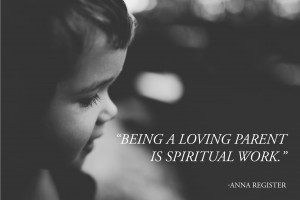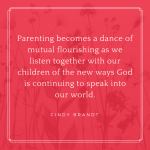
This article is written in response to the following post & comment on our Facebook page:
I am new to the group and not really sure where to start. I have been following the UnFundamentalist Christians page for awhile. I went through a period over the last couple years where I just walked away from everything. But I know I believe in something. My husband is more possibly agnostic at this point. But my daughter keeps asking to go to Sunday School. One of her grandmothers is “classic church lady” and it comes up a lot. We used to do the church 3 times a week thing. From the time she was born until she was about 5 we slowly moved from church to church from “ultra-fundy” to not really fundy. Then we physically moved and decided church wasn’t for us. I know how I want to raise her as a person; I am just lost as to the spiritual aspects. All I know is how I don’t want to raise her.
1) I think one of the bigger issues is that I am struggling with the “what I believe” so that makes it harder to talk with her about what she hears. Although I am all for open conversation, she takes every word an adult tells her as truth….so we work on that. (She is 8 so part of that is age). 2) we grew up in churches with sexual assault/abuse issues. So now, I don’t feel comfortable being separated from my child in a religious setting. And that becomes our biggest issue with taking her places. She really just wants to go play with the kids (and I really want her with me). I went a few Sundays and managed to keep her with me, but it drove my anxiety pretty high. I know that aspect should get better with time if I keep taking her (as long as I have done my due diligence on policy). 3) we are definitely a love based family. And it was easier without family around. In the long term, it should be beneficial that the kids constantly have to have the idea of loving people reinforced while not “being mean” to those who are supporting ideas of separation and hate.
This is a common thread for so many of us – growing up “fundy” and finding ourselves “unfundy” (though often we’re not even sure what that means or where we land) with kids at our ankles looking to us asking questions about God, Jesus, and the Bible only to be met by blank, deer-in-headlights stares. “How do I know, kid?! I don’t know what I believe, much less what YOU should believe.” The struggle is so real.
I hosted a parent dialogue night recently with some of the families in my congregation. (You can watch that talk here.) One question that was asked was, “We keep talking about ‘doing spiritual work with our kids.’ What IS the spiritual work that I’m supposed to be doing?” asked by a mother of 2 children, 1 & 4 yrs old. My response?
“Being a loving mother is the spiritual work.”
Here’s the thing, psychologists tell us that children develop their images and ideas of God EARLY – by age 5 – and those ideas and images are primarily based on their ideas and images of their parents. Their experience of you as a parent is the greatest determining factor of how they will understand God to be. It makes sense – they don’t yet have the verbal skills or life experience to conceptualize God any other way. They work with what they know. So in response to the statement, “I know how I want to raise her as a person; I’m just lost as to the spiritual aspects” I say being a loving parent is one of the greatest things you can do for your child’s spirituality. She is a spiritual being, as are you. Raising her to be a full, loving human is attending to her spiritual nature, necessarily. Not using some of the church’s language doesn’t make your work less spiritual.
Of course, older children (ages 7+) are starting to think more abstractly. Developmentally they can break some of this “God stuff” down in more complex ways, ask more difficult questions. One thing they’re understanding at this age is metaphor. Use this to your advantage when talking about God. Things like, “God is like light” or “God is like wind or a warm hug.” This may help them conceptualize how they’re feeling/thinking about God. Another approach could be to make note of spiritual qualities in the people and things you see around you. If you’re driving down the road and you see someone helping another person across the street acknowledge it with your child by saying, “What a loving thing to do” or “That makes me feel good. I want to do something kind for someone now.” Show them that beauty, truth, and goodness are all around if they’ll just look for it. They don’t have to be in a Sunday School classroom to see these things. Whatever method you choose, one thing is certain – we don’t get to not talk about these things with our kids just because we’re confused.
Yes children are looking to us for answers. But more than anything, especially with older kids, they’re looking to us for validation of their questions. They need to know that the ones who care for them the most understand them, love them, and find their ideas valuable. Instead of responding with a simple, “I don’t know…” follow that up by asking them what they think. It’s very likely that your 8 year old already has an idea in mind when she’s asking these questions.
And – here’s the trick: ACTUALLY LISTEN to what they have to say. Naturally, it’s assumed parents are supposed to have answers. Conversely, it’s assumed that children most certainly don’t have any answers. But we’re missing it if this is how we operate with our children, specifically on spiritual matters. Kids have thoughts on these things. They are, after all, spiritual beings. We all are. It’s in our bones. However, children are in such a fascinating developmental phase of life and experiencing the world in such a unique, magical way. Ask them about what they’re thinking/experiencing. Explore with them. It is very likely that you’ll learn something from them along the way.
This struggle that so many of us find ourselves in is a life-long deal. As it should be. This is big. We’re talking about the Ultimate Mystery, Immanent & Transcendent Divinity…to pretend to have it all figured out is not actually a service to our children. Model for them what it means to care for something so much that you spend your whole life trying to understand it. There are so many lessons to be learned by that – continuously learning, exercising spiritual imagination, growing and changing, hard work, etc. Your struggles don’t have to be her struggles. But don’t be afraid to let her know you’re struggling. She may actually be able to help you! If you are doing the difficult work and helping her to do the same – even if you don’t always arrive a the same conclusions – you’re on the right track.
Dealing with family who believe differently is another common challenge for many of us. One of the most important things I think we can say to our children is this: “It’s okay that some people don’t think the same way you do.” Difference of opinion is good and healthy. That said, this post begs the question: what do we do with harmful differences?
Teach your kids to LOVE THE PEOPLE WHO HAVE HARMFUL THEOLOGIES. Dealing with family will always be tough – they are your people, they are where you come from. And it’s hard to exist as a different person than what they know or expect you to be. What’s ultimately important is to love them well. Sometimes that means calling them out – “Hey that’s not okay to say.” That’s our charge, perhaps, as adults. With our children, our best “defense” is to keep lines of communication open. Always talk to your kids before and after their time with family if a difference in theology/politics/ideals is a constant struggle. Talk about why certain ideas might be harmful and work as a family to develop other ideas and beliefs that works to lift others up. Break down harmful theological structures – not the PEOPLE who live under them.
Speaking specifically to the issue of sexual assault/abuse in churches – this breaks my heart, as a Children’s Pastor. I want to be careful how I address this particular part of your concern because I have not myself experienced that trauma and I, in no way, want to dismiss your experience. So hear me saying – I’m so sorry this has happened to you. I’m so sorry the church has not been a safe place for you and your family. But take courage and heart – it can be and some places truly are. Give your child a chance to have a different experience of church than you did. The pattern doesn’t have to repeat itself. I can tell you that everyone I know in this “business” does a great deal of work to ensure safety for the children in their care. It should be the top priority (alongside FUN) for every children’s ministry. Don’t be afraid to ask a director or pastor of a Children’s program what their protocol is for various situations. How does check-in/check-out work? How do we prevent sexual assault/abuse? Everyone should have a policy in place for this and should be open and willing to answer any questions you have. That’s part of the job. And if they don’t have policies in place, ask for them. Just know – there are lots of us out there who have this at the forefront of our minds always.
And of course, teach your child about consent – EARLY. Teach them to say “no” and to find a safe adult when they feel uncomfortable in a particular situation. Teach them to look for adults who encourage them to be strong and brave, adults who give them choices, adults who ask them how they are feeling, and adults who give them their space when they ask for it. These are safe adults. Safe adults are everywhere.
Finally, if a religion of love is all all you can agree on between yourself (in limbo), your husband (agnostic) and your daughter (curious and wondering), that is sufficient and perhaps what the world needs most. It’s what Christianity is meant to be: a religious system that lifts up those who can’t lift themselves, cares for the poor, stands with the oppressed, and frees people from systems of oppression and obstruction. The way of Jesus, the path of peace, is meant to be a model by which we help the world to see a better way to do life: to love one another fully in our humanity, beautiful and holy.












